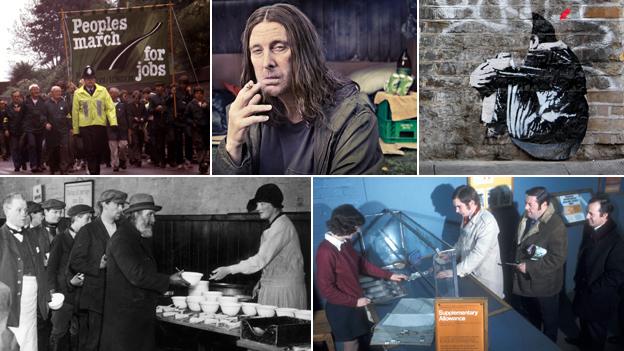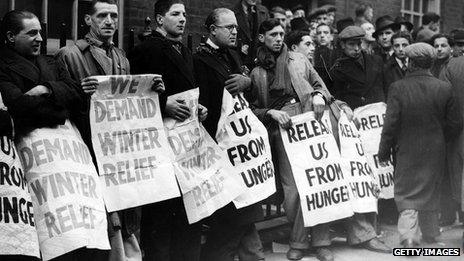Beveridge report: From 'deserving poor' to 'scroungers'?
- Published

William Beveridge paved the way for the welfare state 70 years ago. But do people now think more in terms of "scroungers" than the "deserving"?
Sir William Beveridge's blueprint for the welfare state - the report on Social Insurance and Allied Services - came at what was not an obvious time for a bold social plan.
The UK was at war.
Yet the report proved a huge success with the public and by February 1944 over 600,000 copies had been sold, external.
Under Clement Attlee's post-war government, the National Insurance Act of 1946 created unemployment, pension, sickness and child benefits. Two years later, the National Health Service was founded.
Fast forward to the present. The NHS is as popular as ever. The basic state pension has been bolstered and linked once more to earnings, external.
But the benefits system is viewed differently.
The recent British Social Attitudes Survey reported, external a string of negative perceptions on welfare. More than a third of the population (37%) thinks that most people on the dole are "fiddling".
Almost two-thirds of people (62%) think unemployment benefit is too high and discourages work. In 1993, during the last recession, the figure was 24%.
The authors of the report were surprised. During the recessions of the 1980s and 1990s, support for benefits went up. This time that hasn't happened.
Today six out of ten people agree with the proposition that "around here most unemployed people could find a job if they wanted one". In the early 90s, only three out of ten people agreed.
Is fear of the welfare scrounger a modern phenomenon?
The Beveridge report's grand language contained five "giants" - Want, Disease, Ignorance, Squalor and Idleness - to be slain. Extreme poverty was a real fear then.
"The attitude [to benefits] was much warmer in those days," says Nicholas Timmins, author of The Five Giants: A Biography of the Welfare State. "The late 1940s and 1950s were well within living memory of the Great Depression when you'd had three million unemployed in a smaller population."
There had been a system of unemployment benefit in the 1930s, but it was aggressively means tested. "There was quite a folk memory about the means test of the 1930s," Timmins says. It was seen as very harsh - even a paper round could mean disqualification.
Jose Harris, author of Beveridge: A Biography, says that even during the Hungry Thirties public suspicion of the scrounger existed.
But the war banished that with its sense of common purpose and social solidarity. High emergency taxes and rationing imposed a redistributive, egalitarian economic model. Above all there was work for everyone.
"There were no scroungers," says Harris. "You were put to work in the Army, the pioneer corps or the factories."

Support for a more protective state was not confined to the Labour Party. Churchill's government began the process in 1944 by setting up a Ministry of National Insurance. In short, welfare had wide support.
The country was deeply indebted at the end of World War II to the US, bread was rationed and life austere. But there was less of a sense of division between those who worked and those who claimed benefits. Nearly everyone - or rather, nearly every working-age man - had a job. Full employment lasted for the following two decades.
Today policymakers talk with alarm about the 340,000 households in which no-one has ever worked, external.
In Beveridge's time unemployment hovered about 2%. Crucially only 9% of the unemployed were out of a job for more than a year, compared with 30% today, Timmins notes.
Beveridge's system was about social insurance. People paid in contributions and got back benefits at times of need. It was simple. Contributions and benefits were both flat rate and everyone, regardless of income, was entitled to be part of the system.
The benefits were not supposed to be generous. "The state in organizing security should not stifle incentive, opportunity, responsibility," Beveridge wrote. "In establishing a national minimum, it should leave room and encouragement for voluntary action by each individual to provide more than that minimum for himself and family."
But over time, cracks were revealed.
By the 1950s it had become increasingly clear that not everyone could afford the contributions. And inflation meant that the payments were not enough and had to topped up by means tested benefits, says Harris.
And unemployment was on the march as Britain's industrial base declined.
It passed a million in the 1970s and by the early 1980s it had reached three million. It created a society split between those who worked and those who didn't.
Margaret Thatcher's employment secretary Norman Tebbit said in 1981: "I grew up in the 1930s with an unemployed father. He didn't riot. He got on his bike and looked for work, and he kept looking 'til he found it."
Today some hold a view that the past's "deserving poor" have been replaced by families living in council houses equipped with flat-screen TVs, games consoles and regular holidays.
Kelvin Mackenzie, who edited the Sun during the 1980s, says he's angered at the vista of satellite TV dishes on central London council estates. "They're getting a flat in central London subsidised by the taxpayer and yet these guys can still find £60 to £80 a month to subscribe to Sky TV."
The scope and ambition of the welfare system has certainly expanded.
Historian Dominic Sandbrook noted earlier this year that spending on welfare as a proportion of GDP has risen from 4.7% in 1951 to 7.2% last year. Beveridge's frugal vision has been turned into a "gigantic exercise in Whitehall empire-building", he concluded.
Its scope has grown because society is very different now, says Timmins. There are many more pensioners and people registered as disabled. And wages at the bottom have been driven down by globalisation, requiring top ups from tax credits, he says.
This in turn has created baffling complexity.
Critics claim that the people who gain most are those looking to cheat.
Even governments have been accused of cheating - fiddling the figures for political gain. In 1998 the total on incapacity benefit was "1.7m and rising", Tony Blair wrote in his memoirs. The joblessness total "masked the huge rise in numbers on incapacity benefit that had taken place under the Tories and was continuing under us" he admitted.
The Department for Work and Pensions estimates, external that 2% of total benefit expenditure for 2011/12 was overpaid due to fraud and error.
Immigration - rare in Beveridge's day - may have played a role in the change of attitudes towards benefit claimants. David Goodhart, director of think tank Demos, has posited, external that as society becomes ever more diverse, the sense of shared values needed to sustain a redistributive welfare system is weakened.
Beveridge's idea that welfare should reward individuals and families who have paid in to the system is undermined by the practice of giving council housing and benefits to newly arrived immigrants, critics like former minister Margaret Hodge have argued, external.
Mackenzie offers a different spin on migration. Many indigenous British people could work if they wanted to but are content to stay on benefits, he and others argue, whereas eastern Europeans arrive with little but are soon working.
"I love these people. They can travel thousands of miles from Budapest, get here with no money, can't speak English but they have ambition. And they find work."
The idea that people choose a life on benefits is false, says Imran Hussain, head of policy at the Child Poverty Action Group.
Academics, who have tried to find families where different generations have never worked, struggle to find people, he insists. And nine out of 10 people move off jobseekers allowance within a year. "It's not that people don't want to be in work, it's that the labour market doesn't hold them," he says.
Neither are benefits "generous", supporters of the welfare system argue. Standards of what is basic have changed.
It used to be the case that having a washing machine was a sign of wealth. Not anymore. And the same applies to families with plasma TVs and mobile phones, Hussain says.
"Poverty is about not being able to participate in society as other people do," he argues.
There's nothing new in the concept of the undeserving poor. The disturbing thing is the way the "hysteria" over the dependency culture is distorting the system, he says. It used to be fraud that critics objected to. Now that fraud is at a historic low, they have changed their position arguing that people on benefits lack motivation.
The public's suspicion that most people could find a job or are "on the fiddle" just don't stand up to reality, says Times columnist David Aaronovitch. Working people on tight budgets could blame the bankers, he suggests, but they are more likely to round on people who are like them but claiming benefits.
"The very rich are not like you - you might resent them from afar. But these people, the claimants are very close to you, you might even know them. You don't feel you are making enough money so you resent people asking for help," Aaronovitch says.
It's impossible to know what Beveridge would make of today's obsession with scroungers. He was a man of austere tastes - he took a cold bath every morning - who struggled with personal relations, Harris says. "He thought he could move people like chess pieces around a board."
Those pieces are not where he'd want them, she believes. "He'd be quite horrified by the current welfare state. His system was designed to support economic activity to the fullest extent. He'd think that was not the case today."
You can follow the Magazine on Twitter, external and on Facebook, external